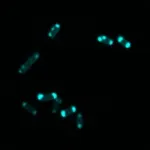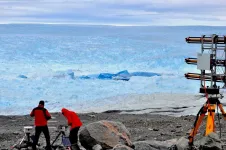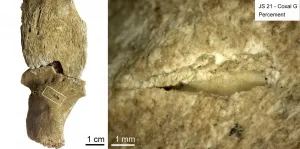Not fear, but goal importance and others' behavior makes you favour COVID-19 measures
2021-05-27
(Press-News.org) While earlier research has mostly looked into factors such as fear, perceived risk, age and political views to determine what makes individuals and societies more or less willing to drastically change their lifestyle and support government-imposed strict restrictions, in order to mitigate the spread of the COVID-19 pandemic, psychologists at the University of Zurich Charlotte Kukowski, Katharina Bernecker and Veronika Brandstätter took a different perspective.
Instead, they chose to find out the impact of people's perception of others' behaviour when it comes to the public good, as well as people's own self-control in sticking to behaviour guidelines. By using data from the United Kingdom and Switzerland, they concluded that, indeed, valuing fair contribution to the public good and the ability to practice self-control make people more likely to undertake health-protective behaviour, though the effects for self-control are not entirely consistent across the countries the authors sampled. Further, people who are more concerned with the cooperation of their fellow citizens and expect them to do their own part are more supportive of government regulations, possibly as a means of ensuring that others comply. However, the authors stress that future studies need to test this possible link. The study is published in the peer-reviewed, open-access scientific journal Social Psychological Bulletin.
Successfully overcoming conflicting desires and needs, such as taking public transportation, meeting with friends, and participating in large gatherings, for the benefit of society means that people must practice self-control. People will only be willing to control their desires and needs, however, if they value the higher goal, that is, managing the pandemic, even though their own health-protective behavior might not affect them directly. In this sense, self-control in the service of a societal goal is quite different from self-control for a personal goal, such as sticking to a healthy diet or meeting career goals.: While exercising and career achievements are largely private concerns, we all depend on each other's cooperation when it comes to a societal goal like managing COVID-19 pandemic. Therefore, in the context of the COVID-19 pandemic, higher goal importance and perception of others' behavior are key factors in practicing health-protective behavior.
"(...) we would like to emphasise that the effects of self-control and cooperation emerged above and beyond the effects of variables such as personal cost of engaging in health-protective behaviors, perceived risk and anxiety, and political orientation. If future work replicates these findings, one might cautiously conclude that, in a time of crisis, people - including decision-makers - are indeed able to "rise above themselves" and lay aside political differences and personal costs for collective goal attainment," say the researchers.
The authors note that in collective actions, it is essential that one sees others put in the same effort.
In conclusion, the scientists note that, in order to improve public efforts in combating the COVID-19 pandemic, as well as other collective goals, including climate change mitigation, it is essential that we identify the factors contributing to successful self-control and cooperation in the service of higher, society-level goals.
INFORMATION:
Research article:
Kukowski, C., Bernecker, K., & Brandstätter, V. (2021). Self-Control and Beliefs Surrounding Others' Cooperation Predict Own Health-Protective Behaviors and Support for COVID-19 Government Regulations: Evidence From Two European Countries. Social Psychological Bulletin, 16(1), 1-28. https://doi.org/10.32872/spb.4391
Corresponding author:
Charlotte Kukowski, Department of Psychology at University of Zurich, Switzerland
Email: c.kukowski@psychologie.uzh.ch
Visit the Social Psychological Bulletin's website and follow the journal on Twitter.
Additional information:
About Social Psychological Bulletin (SPB):
Social Psychological Bulletin (Psychologia Spoleczna) is an open-access quarterly journal that publishes original empirical research, theoretical review papers, scientific debates, and methodological contributions in the field of basic and applied social psychology. SPB actively promotes standards of Open Science, supports an integrative approach to all aspects of social psychological science and is committed to discussing timely social issues of high importance.
About PsychOpen:
Offered by Leibniz Institute for Psychology Information (ZPID), PsychOpen is an online platform for publishing primary scientific contributions in psychology. All publications in PsychOpen are accessible free of charge (open access). Journals published on PsychOpen GOLD must meet clearly defined quality standards such as peer review of the submitted articles, an international editorial board, and English-language metadata. PsychOpen supports the psychological research community in their specific communication needs (community-based publishing). Publication projects are developed within the community and are supported by the community. In this context, emphasis is placed on European psychology.
About Leibniz Institute for Psychology Information:
The Leibniz Institute for Psychology Information (ZPID) is the supra-regional scientific research support organization for psychology in German-speaking countries. It supports the entire scientific work process from gathering ideas and researching literature to documenting research, archiving data and publishing the results, based on an ideal-type research cycle. It is committed to the idea of open science and sees itself as a public open science institute for psychology.
ELSE PRESS RELEASES FROM THIS DATE:
2021-05-27
AUSTIN, Texas -- In the perpetual arms races between bacteria and human-made antibiotics, there is a new tool to give human medicine the edge, in part by revealing bacterial weaknesses and potentially by leading to more targeted or new treatments for bacterial infections.
A research team led by scientists at The University of Texas at Austin has developed chemical probes to help identify an enzyme, produced by some types of E. coli and pneumococcal bacteria, known to break down several common types of antibiotics, making these bacteria dangerously resistant to treatment.
"In response to antibiotic ...
2021-05-27
New York, NY--May 27, 2021--While our facial expressions play a huge role in building trust, most robots still sport the blank and static visage of a professional poker player. With the increasing use of robots in locations where robots and humans need to work closely together, from nursing homes to warehouses and factories, the need for a more responsive, facially realistic robot is growing more urgent.
Long interested in the interactions between robots and humans, researchers in the Creative Machines Lab at Columbia Engineering have been working for five years to create EVA, a new autonomous robot with a soft and expressive ...
2021-05-27
Reanalysis of the prehistoric cemetery Jebel Sahaba (Sudan), one of the earliest sites showing human warfare (13,400 years ago), suggests that hunter-fisher-gatherers engaged in repeated, smaller conflicts. The findings are published in Scientific Reports. Healed trauma on the skeletons found in the cemetery indicates that individuals fought and survived several violent assaults, rather than fighting in one fatal event as previously thought.
Isabelle Crevecoeur and colleagues reanalysed the skeletal remains of 61 individuals, who were originally ...
2021-05-27
Shortly before Jakobshavn Isbræ, a tidewater glacier in Greenland, calves massive chunks of ice into the ocean, there's a sudden change in the slushy collection of icebergs floating along the glacier's terminus, according to a new paper led by the Cooperative Institute for Research in Environmental Sciences (CIRES) at CU Boulder. The work, published in Nature Geoscience, shows that a relaxation in the thick aggregate of icebergs floating at the glacier-ocean boundary occurs up to an hour before calving events. This finding may help scientists better understand future sea-level rise scenarios and could also help ...
2021-05-27
Since its discovery in the 1960s, the Jebel Sahaba cemetery (Nile Valley, Sudan), 13 millennia old, was considered to be one of the oldest testimonies to prehistoric warfare. However, scientists from the CNRS and the University of Toulouse - Jean Jaurès (1) have re-analysed the bones preserved in the British Museum (London) and re-evaluated their archaeological context. The results, published in Scientific Reports on May 27, 2021, show that it was not a single armed conflict but rather a succession of violent episodes, probably exacerbated by climate change.
Many individuals buried at Jebel Sahaba bear injuries, half ot them caused by projectiles, the points of which were found in the bones or the fill where the body was located. The ...
2021-05-27
What The Study Did: The findings of this systematic review and meta-analysis indicate that enhanced personal protective equipment is associated with low rates of SARS-CoV-2 transmission during tracheostomy.
Authors: Phillip Staibano, M.Sc., M.D., of McMaster University in Ontario, Canada, is the corresponding author.
To access the embargoed study: Visit our For The Media website at this link https://media.jamanetwork.com/
(doi:10.1001/jamaoto.2021.0930)
Editor's Note: The article includes conflict of interest disclosures. Please see the article for additional information, including other authors, author contributions and affiliations, conflict of interest and financial ...
2021-05-27
What The Study Did: This survey study of adults living Michigan during the COVID-19 pandemic examines associations between race/ethnicity, medical mistrust within racial/ethnic groups and willingness to participate in COVID-19 vaccine trials or to receive a COVID-19 vaccine.
Authors: Hayley S. Thompson, Ph.D., of the Wayne State University School of Medicine in Detroit, is the corresponding author.
To access the embargoed study: Visit our For The Media website at this link https://media.jamanetwork.com/
(doi:10.1001/jamanetworkopen.2021.11629)
Editor's Note: The article includes conflict of interest and funding/support disclosures. Please see the article for additional information, including other authors, author contributions and affiliations, ...
2021-05-27
What The Study Did: In this study of 1,597 Big Ten athletes who had comprehensive cardiac screening, including cardiac magnetic resonance (CMR) imaging, after COVID-19 infection, 37 athletes (2.3%) were diagnosed with clinical and subclinical myocarditis. Researchers report CMR screening increased detection of myocarditis, a leading cause of sudden death in competitive athletes.
Authors: Curt J.Daniels, M.D., and Saurabh Rajpal, M.B.B.S., M.D., of Ohio State University in Columbus, are the corresponding authors.
To access the embargoed study: Visit our For The Media website at this link https://media.jamanetwork.com/
(doi:10.1001/jamacardio.2021.2065)
Editor's ...
2021-05-27
CAMBRIDGE, MA -- Nitrogen, an element that is essential for all living cells, makes up about 78 percent of Earth's atmosphere. However, most organisms cannot make use of this nitrogen until it is converted into ammonia. Until humans invented industrial processes for ammonia synthesis, almost all ammonia on the planet was generated by microbes using nitrogenases, the only enzymes that can break the nitrogen-nitrogen bond found in gaseous dinitrogen, or N2.
These enzymes contain clusters of metal and sulfur atoms that help perform this critical reaction, but the mechanism of how they do so is not well-understood. For the first time, MIT chemists have now determined the structure of a complex that forms when N2 binds to these clusters, and they discovered that the clusters are able to weaken ...
2021-05-27
A massive genome-wide association study (GWAS) of genetic and health records of 1.2 million people from four separate data banks has identified 178 gene variants linked to major depression, a disorder that will affect one of every five people during their lifetimes.
The results of the study, led by the U.S. Department of Veterans Affairs (V.A.) researchers at Yale University School of Medicine and University of California-San Diego (UCSD), may one day help identify people most at risk of depression and related psychiatric disorders and help doctors prescribe drugs best suited to treat the disorder.
The study was published May 27 in the journal Nature Neuroscience.
For the ...
LAST 30 PRESS RELEASES:
[Press-News.org] Not fear, but goal importance and others' behavior makes you favour COVID-19 measures



